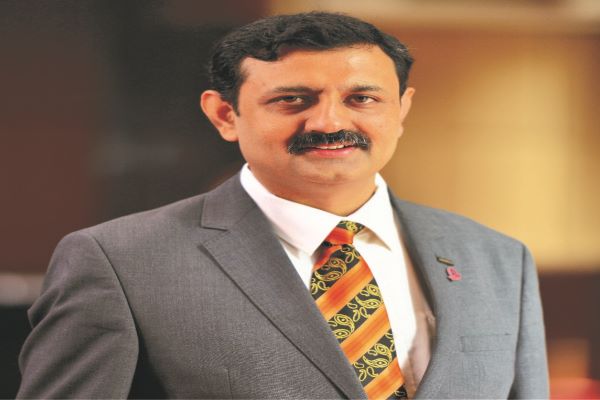Fujifilm has been at the forefront of medical imaging and healthcare informatics. It’s developing new AI platforms to address medical challenges. Chander Shekhar Sibal, Sr. Vice-President, Fujifilm India gives us an insight in an interview with Thomas C. Thottathil, Editor, indianpharmapost.com

Chander Shekhar Sibal,Sr. Vice-President
Could you explain how Fujifilm has transformed the healthcare technology landscape in India?
As a pioneer in imaging systems, Fujifilm plays a major role in transforming healthcare technology in India. We have introduced the CAD EYE function which supports real-time detection of colonic polyps during colonoscopy utilising AI technology. We have also introduced Covid-19 pneumonia diagnosis software which analyses chest CT images and displays findings and FDR Nano X-ray which is a portable X-Ray machine designed to unburden healthcare workers. We have also introduced Digital Mammography, Tomosynthesis and many more to the Indian market.
In terms of innovation, the MedTech sector is evolving rapidly, what can the healthcare sector expect from your company?
We wish to expand our medical device business into high-end screening machines, with an eye on both the domestic and international markets. We also supply diagnostic imaging and information systems to health care facilities and intend to introduce high-end screening equipment in India and other international markets.
You ran a TB campaign in India across states. India is home to the highest number of TB patients. What has been the learning and did you engage with doctors and what were the solutions?
Tuberculosis is a major health problem in India, but it is also a curable disease. The National TB Elimination Programme estimates that as of 2019, there were 2.64 million TB cases in India. Our campaign “Never Stop: Screening to Reduce Diagnostic Delays” is focused on organizing the marginalized sectors of society to fight tuberculosis by providing door-to-door awareness. In just six months, we covered 17 cities and screened more than 7 lakh people through the mobile van. While we were covering various cities, interacting with doctors and engaging with patients, we realised that education has been a major problem in these areas. There is a lack of awareness amongst the masses, and the language barrier is a major concern. We realised that organisations and parties engaged in this fight against tuberculosis needed to localise their messaging and information outreach in order to educate the maximum number of people. We also found out that there are major gaps in the availability of medical screening facilities in tier-2 & 3 cities. People have to travel far to get diagnostic facilities at affordable rates and this prevents many patients from getting screened for TB. We have tried to address all these learnings in our campaign and look forward to making more improvements as we move to the next cities in our drive.
Do you plan to work with state governments or NGOs on a similar programme for other diseases?
Yes, we continue to work with NGOs, as we have in the past with Parwarish Cares Foundation, to raise awareness about child sexual abuse in society and to eradicate the problem by 2030. Similarly, we have conducted instructional sessions in a number of schools. We are always looking to collaborate with more NGOs and state governments to bring about change in India's healthcare sector in every possible way.
Covid-19 has spurred a lot of domestic innovations in the MedTech space. Is there a challenge for you in this area when the underlying theme is to promote Make in India products?
We are committed to the Make in India campaign and have started getting our mobile DR manufactured through Skanray, called MicroSkan DR, which provides exceptional image quality at a lower dose and enhances the efficiency of point of care X-rays. We have also started exporting mobile X-rays from India this year.
The use of AI and IoT to develop advanced medical systems have led to breakthroughs across the sector. What has been the success on this front?
Doctors can now spot repeating patterns across massive amounts of data and warn patients of probable health concerns based on reference groups thanks to the introduction of machine learning algorithms. Artificial intelligence is being used in the healthcare industry to help forecast such events and assist clinicians in taking extra safeguards. Through this, there is ready and secure access to a patient's medical data by studying and evaluating their conditions because of this technology.
With a big patient database, India's healthcare industry is one of the largest in the world. Healthcare providers are researching the application of AI programmes in insurance verification, skin cancer diagnosis, test result interpretation, and medical record data analysis. We're also starting to delve into the depths of healthcare ideas that can be unleashed as AI technology advances. Thanks to its history of innovation in medical imaging and healthcare informatics, Fujifilm has built new AI platforms like REILI to meet the current needs of patients. Specialists will be able to deliver more accurate diagnoses to their patients by utilising technology such as Image Processing and Artificial Intelligence.
What was the idea behind the Never Stop campaign?
The "NEVER STOP 2021" campaign was launched in India in 2019 with the purpose of boosting awareness of Fujifilm's commitment to long-term company growth and to "never stop" developing new technologies and capabilities. The campaign captured the brand’s essence of offering innovation and holistic expertise to its customers across sectors. The 2021 edition of the campaign emphasizes on the various Fujifilm divisions that are helping the world evolve and remove barriers to social growth. The campaign represents Fujifilm’s successful transformation from a photographic film manufacturer to a company contributing to the betterment of society with a wide range of business verticals like healthcare, graphic arts, storage media and wellness centres along with the consumer favourite camera division. "NEVER STOP 2021" campaign highlights our diverse products and solutions that are helping to improve the world.

Subscribe To Our Newsletter & Stay Updated